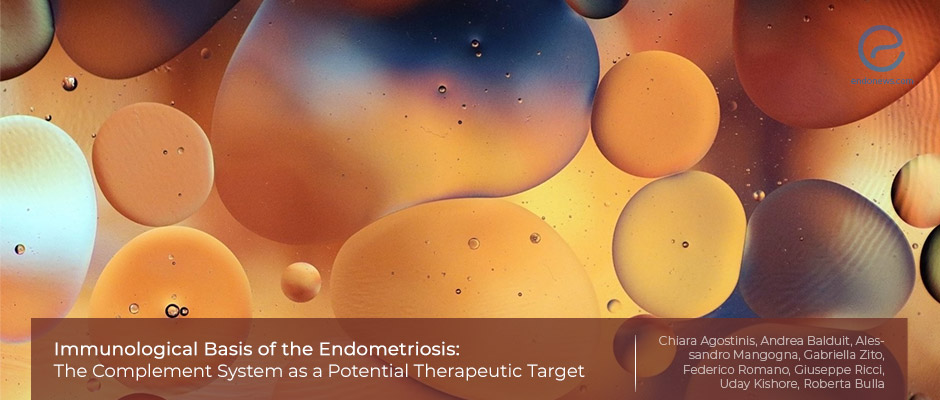"Complement" of immune system and endometriosis therapeutics
Mar 3, 2021
Why is "complement" important?
Key Points
Highlight:
- This is a review article focuses on understanding how the "complement" part of the immune system influences endometriosis.
Importance:
- In-depth understanding of the complement system in endometriosis may lead to future therapeutics.
What has been done:
The authors discuss several crucial aspects:
- Alterations of the complement system in the endometrial lesions.
- The complement components found in endometriosis-derived cells and in endometriosis-associated peritoneal fluid.
- Importantly, the possibility of anti-complement immunotherapy in endometriosis.
Results:
- The dysregulation/activation of complement system in endometriosis has been reported by several studies, and is believed to contribute to the chronic inflammation in endometriosis.
- Complement inhibition may be a useful tool for treating endometriosis.
- There are a number of complement inhibitors under pre-clinical and clinical development for other conditions; their use in intervention for endometriosis require careful future studies.
Limitation:
- While several data have pointed out that the complement system may be a promising therapeutic target in endometriosis, the actual studies that tested complement inhibitors in the endometriosis preclinical model still remains limited.
Lay Summary
The complement system is part of the body’s immune system, and plays integral roles in the recognition and clearance of pathogens, apoptotic and necrotic cells. It is composed of over 50 proteins with soluble activation precursor components, regulators and cell surface receptors. It functions to tag or flag non-self (pathogens), altered self (apoptotic/necrotic cells, and protein aggregates), and transformed self (tumour cells) antigens. Ultimately, their recognition leads to lysis of these targets, the subsequent uptake by phagocytic cells, and the production of inflammatory mediators.
The complement system can be activated by three major pathways, i.e., classical, lectin, and alternative. All the three pathways of activation generate variants which activates component C3, causing a cascade of further cleavage and activation events leading to enhanced internalization by phagocytic cells.
This review by Agostinis et al. at Institute for Maternal and Child Health, IRCCS (Istituto di Ricovero e Cura a Carattere Scientifico) “Burlo Garofolo”, Trieste, Italy, has focused on the current understanding of the role of complement activation in endometriosis. The knowledge helps to shape potential future treatment modalities for endometriosis based on the complement pathway of the immune system. The article was published in Frontiers in Immunology.
The presence of C3 in endometriotic tissue was first highlighted in 1980 and subsequently confirmed by other investigators in samples of endometrial tissue of patients undergoing laparoscopy. Since then, several studies have shown the presence of complement components in endometriosis lesions, and that the gene and protein expression of C3 appeared much higher in ectopic endometrium than then matched patients eutopic endometrium.
Endometrial tissue complement activation is also frequently reported, where it is believed that the causes of complement activation are triggered by the endometriosis microenvironment due to the coagulation cascade resulted from periodic bleeding of endometriosis tissue. Processes in the coagulation cascade e.g., the action of thrombin and activated platelets can cleave C3, at the same time heme released from haemoglobin is another activator of C3.
In endometriosis tissue, C3 and other complement genes are the most up-regulated as compared to normal endometrium. In a mouse model, C3-deficient mice showed a lower capacity to form endometriosis in the peritoneum than the wild-type mice. This data suggest that the complement system participates in the pathogenesis of endometriosis. Therefore, a complement C3 inhibitor may be used for treating endometriosis. Such an inhibitor may be beneficial because it can interrupt the cascade of inflammatory signals which contribute to endometriosis. In addition, it may also promote the cytotoxic activity of natural killer cells, which is important to control endometriosis progression.
Together, these observations have highlighted that aberrant complement activation can promote endometriosis. There are several strategies to suppress complement activation. However, there is currently limited data to show whether these approaches are useful. Therefore, future studies on these new interventions are warranted.
Research Source: https://pubmed.ncbi.nlm.nih.gov/33505394/
immune system new therapy

